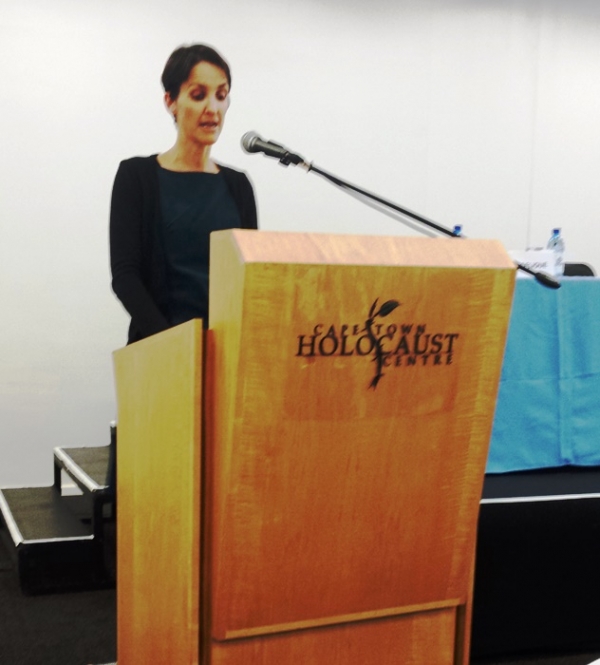

Caroline Skinner speaking on World Refugee Day said there is a critical and urgent need to tackle collective violence against migrant owned shops and businesses. Picture by Tariro Washinyira.
17 June 2015
Saturday 20 June is World Refugee Day. In a keynote address at an event organised by the Scalabrini Centre and the Holocaust Centre in Cape Town, Caroline Skinner, senior researcher at The African Centre for Cities (ACC) at the University of Cape Town, shared timely new research about the role of migrants and refugees in the informal economy.
The ACC and partners initiated a large scale research project to examine the role of migrant entrepreneurs in the informal economy. They conducted over 2,000 interviews with migrant business owners in Cape Town and Johannesburg, but also cross-border traders. This was with a view to test the myths and stereotypes around migrant economy activity with hard evidence, and to initiate a conversation about the positive contribution which migrant entrepreneurs make to South Africa.
The findings of the project showed that migrants are making a significant contribution by servicing the needs of poorer consumers who can access cheap goods often in appropriate quantities, at places and times of day that are convenient or have their niche demands met. Immigrants also introduce new products, business activities and opportunities, and bring scarce skills like manufacturing particularly into the township economy.
Another contribution is that of paying rent largely to South Africans. 56% of 500 migrants interviewed in Cape Town and 43% of Johannesburg interviewees were paying rents to either South Africans or the City Council. The Cape Town interviewees were paying on average R2,200 a month, while in Johannesburg 60% of interviewees who paid rent, paid R1,000 or more.
The data refutes the xenophobic ‘wisdom’ that migrants take jobs from South Africans. Entrepreneurs generate employment. In Johannesburg, where interviews were conducted with both South African and foreigner informal operators, foreigners were found to be twice as likely to employ people
Migrant businesses also support South African business. Cross-border immigrants are largely using South African owned taxis, buses and staying in South African owned and run accommodation establishments. Goods are sourced from the formal economy wholesalers, supermarkets and South African factories. The over 1,000 cross-border interviewees reported an average spending of R10,200 per trip. The majority of these purchases made by migrants are subject to value added tax.
Immigrants seem to be doing slightly better than their South African counterparts in the spaza market because of hard work or long hours put in, careful attention to sourcing of products and servicing customer needs, and a culture of thrift. A study of spazas in Khayelitsha found that only 28% of South African spaza shop owners kept business records compared to 90% of immigrants.
Migrants reported daily harassment, extortion and bribery by officials as a costs of doing business in South Africa. Many entrepreneurs, especially in informal settlements and townships, face constant security threats and enjoy minimal protection from the police. While recent attacks have been violent and widespread, research tracking collective violence against foreigners shows that this dates back to 1997.
Migrant entrepreneurs face many challenges, such as access to financial services and hostile municipal regulators. Informal border traders face harassment by police and border guards, demands for inflated customs duties, and transportation problems.
Female migrants were often reluctant to be interviewed. Many have additional challenges such as household responsibilities and face sexual violence.
Skinner said there is a critical and urgent need to tackle collective violence against migrant owned shops and businesses. The violence will not stop until there are robust sanctions against perpetrators through hate crime legislation and other measures. Criminal charges must be laid and convictions secured. Skinner believes for appropriate policy responses we have to call these attacks what they are, both criminal and xenophobic.
The primary initiative of the inter-ministerial committee on migration has been Operation ‘Fiela’ in which over 1,650 migrants have been arrested. Skinner argued that this was a wholly inadequate response which was likely to exacerbate xenophobic sentiments.
The state and many citizens view migrants as undesirable simply because of their national origins. As a result, migrant entrepreneurs are unable to fully utilise their entrepreneurial skills, experience, grow their business and thus contribute to the economy in an optimal fashion.